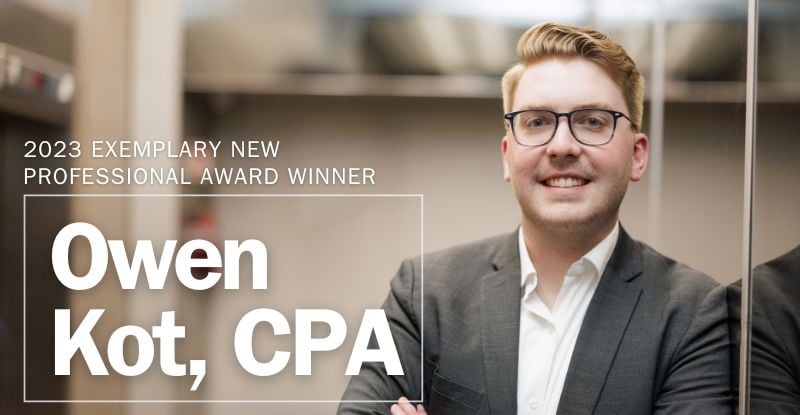
Photo credit: Foto_vika/Depositphotos.com
If you are a Memorandum of Understanding (MOU) candidate, you may be eligible for advanced standing in the CPA Professional Education Program (CPA PEP) to receive exemptions from completing some or all of the CPA PEP modules before attempting the Common Final Examination (CFE).
Check out the FAQs from MOU candidates, such as when to enroll and what resources are available to prepare for the CFE.
The benefit of completing the full Capstone 2 module is that most of the Day 1, 2, and 3 practice cases are evaluated by the National Marking Centre (NMC) and you will receive feedback on your performance on the technical and enabling competencies.
Having the external feedback provided by NMC will help you better assess where your strengths and weaknesses lie before writing the CFE. NMC can provide feedback in areas such as case writing, critical thinking, technical skills and other enabling competencies. It is critical for you to know which areas (technical and enabling) you need to focus on during your CFE preparation.
MOU candidates can register as RMM for Core, Elective and/or Capstone 2 modules (Capstone 1 is not available as an RMM module). For more information on RMM modules, please visit the CPA PEP Modules webpage and the CPAWSB PEP Schedules webpage.
If no further CFE attempts are permitted, then the candidate must apply for re-admission and restart CPA PEP from the beginning of the program to continue the pursuit of the CPA designation. To enroll as re-admission, the current CPA PEP admission requirements must be met, and candidates are no longer eligible for CPA PEP module exemptions. This means the candidate must enroll as re-admission to complete the full CPA PEP modules and successfully pass examinations for Core 1, Core 2, two (2) chosen electives, Capstones 1 and 2, and the CFE.
Check out the FAQs from MOU candidates, such as when to enroll and what resources are available to prepare for the CFE.
1. When should MOU candidates enroll in CPA PEP?
You should choose to enroll in CPA PEP during the same registration period as your first CPA PEP module session (i.e. Spring, Summer, Fall, or Winter) or CFE exam (if only attempting CFE with no CPA PEP modules). For registration period timelines, please visit the CPA PEP Schedules webpage. Read a previous blog post that explores this topic in detail: How to Choose the Correct Registration Session as an MOU (cpawsb.ca).
2. What CPA PEP materials are provided for MOU candidates only attempting the CFE?
- CPA Canada Certification Resource Centre (CRC): This website provides various CPA Canada Resources that can help you become more familiar with CFE. You can find links to various CPA Canada documents such as:
- CFE Reference Schedule
- Past CFE Reports (Board of Examiners’ Report)
- CFE examination regulations
- CFE examination blueprint
- CFE and Competency Referenced Evaluation Methodology (copy PPT presentation which further explains how the CFE is structured).
To access the CRC resources for CPA evaluation, please visit the CPA Canada CRC website.
- CPA Competency Map: This document provides the foundation for the CPA certification program, including education, accreditation, examinations, and practical experience requirements, and describes the knowledge, skills and proficiency levels you must achieve to become a Canadian CPA. View the CPA Competency Map.
- Capstone 1 case: After your Capstone 1 session start date, you will receive an email with the related Capstone 1 case per your CFE registration. The Capstone 1 case is used for preparation for Day 1 of the CFE. The links to Capstone 1 case, and sample report, including appendices can also be found on the CPA Canada Capstones webpage. (Scroll down to the “Capstone 1 cases” section on the webpage).
- Introduction to PEP (D2L): This module provides guidance on CPA PEP policies and other resources, such as:
- Link to the CPA PEP Module Syllabus
- Link to the pdf version of the CPA Canada Learning Library textbooks
- Access to the CPA Canada Adaptive Technical Review and online version of the CPA Canada Learning Library textbooks. You will receive free access to the “Introduction to PEP” module in D2L approximately three (3) weeks after your CPA PEP enrollment.
- Introduction to Capstone 2 and the CFE (D2L) Module: Contains study plans and other resources to begin preparation for Capstone 2. You will receive access to the “Introduction to Capstone 2 and CFE” module in D2L after the Capstone 1 session start date. Many of the CFE preparation resources offered by CPA Canada above are directly included in the Introduction to Capstone 2 and CFE module.
Please note that you must register for the “Capstone 2” module and “Introduction to Capstone 2 and the CFE” module separately. - Knotia: As noted on the CPA Canada website, Knotia is the platform that can be used by all candidates and provides access to the exam reference versions of the CPA Canada Handbook and Income Tax Act during the CFE. It may take approximately a month to get access to the Knotia account after you have completed your CPA PEP enrollment.
3. Why should MOU candidates participate in Capstone 2 if they’ve received an exemption and this module is optional for them?
Capstone 2 is the CFE examination preparatory module to practice before CFE Day 1, 2 and 3 cases. You are strongly encouraged to complete the full Capstone 2 module to help with the CFE preparation even if you are exempted from completing all CPA PEP modules.The benefit of completing the full Capstone 2 module is that most of the Day 1, 2, and 3 practice cases are evaluated by the National Marking Centre (NMC) and you will receive feedback on your performance on the technical and enabling competencies.
Having the external feedback provided by NMC will help you better assess where your strengths and weaknesses lie before writing the CFE. NMC can provide feedback in areas such as case writing, critical thinking, technical skills and other enabling competencies. It is critical for you to know which areas (technical and enabling) you need to focus on during your CFE preparation.
4. What are Review Materials (“RMM”) modules?
RMM modules are self-study modules, meaning:- there are no assignment set activities to submit;
- there is no facilitator/NMC feedback provided; or
- moderated discussion board available.
MOU candidates can register as RMM for Core, Elective and/or Capstone 2 modules (Capstone 1 is not available as an RMM module). For more information on RMM modules, please visit the CPA PEP Modules webpage and the CPAWSB PEP Schedules webpage.
5. Can MOU candidates register for another attempt at CFE after three (3) unsuccessful attempts?
Every candidate has three (3) attempts at the CFE to balance being fair to all candidates while ensuring only those who meet the standards for qualification into the CPA profession become members.If no further CFE attempts are permitted, then the candidate must apply for re-admission and restart CPA PEP from the beginning of the program to continue the pursuit of the CPA designation. To enroll as re-admission, the current CPA PEP admission requirements must be met, and candidates are no longer eligible for CPA PEP module exemptions. This means the candidate must enroll as re-admission to complete the full CPA PEP modules and successfully pass examinations for Core 1, Core 2, two (2) chosen electives, Capstones 1 and 2, and the CFE.


.jpg?ext=.jpg)




